Reflections from Year 22
Well, I officially have wrapped up my 22nd year of teaching. What a wild ride! This year taught me a lot, challenged me, stretched me, surprised me, humbled me, and excited me in ways that no other school year has done. I call it a wild ride because by the end of the year, I got very used to responding to questions with the same words, "I have no idea. I'm just along for the ride." When every step you take is a new one where you have no prior experience to attach it to, it's like walking with a blindfold and trusting that the steps you're taking will get you to the right destination.
Now that I have a full year of teaching 6th grade at my particular school in my specific city in the state of Indiana, I can reflect on what challenged me, what I learned, what went well versus what I can do better, and what I am looking forward to in the year ahead.
What challenged me?
After teaching the majority of my career in (obnoxious) high-stakes-testing-Texas and then jumping into Indiana Public Schools, I definitely went through quite a bit of culture shock. Within the first few weeks, I felt like I'd stepped back in time at least a decade. I half way expected that when jumping into a Dual Language program just starting their 7th year after leaving a district in their 23rd year of the program. I didn't expect, though, to hear the same conversations I heard years ago about tiptoeing around the subject of dyslexia when Texas has already made so much advancement over the last decade in screening, testing for, diagnosing, and educating children with dyslexia. After seeing the incredible difference that early intervention can make in a child's educational outlook, I was so sad to see so many students here in Indiana who clearly could have and should have made much bigger strides before getting all the way to sixth grade still unable to read or write much.
The second major culture shock was coming from a school that almost mandated daily small group intervention both in Reading and in Math during the school day, after-school tutoring twice a week, and then Saturday school before state testing and then coming to a school busy with countless extracurricular activities, clubs, and sports but not a single day for after school tutoring. I got so used to being able to reteach to my struggling students in tutoring without the rest of the class there, and I really struggled to find ways to help those students here in the same way. We may have griped and complained in Texas about how tutoring was a waste of time, but I sure do see the value in it now.
My third area of culture shock came during the "testing season". I'm used to prepping kids for a test and then keeping an entire building quiet for the majority of the day on test day as students tested for anywhere between 90 minutes and six hours. We usually wanted to strangle the kids who only took 90 minutes, while we praised the kids that took several hours because it showed their perseverance in difficulty and their willingness to take their time and work hard. Then I came here and found out that we only let kids test for about an hour a day, 90 minutes max, and we break the test into two days or three days. I am from the mentality that it's not easy to get into test mode, so once you're in it, stay in it till you're done! Here the mentality is that kids can do better if they work for shorter amounts of time and come back to it. So rather than lose a day to test in a certain subject, you basically lose a week of routine instruction. Rather than a day for Reading, a day for Math, and a day for Science or History testing, it's a week for Reading, another week for Math, and another day or two for Science and/or History. Needless to say, I definitely struggled with the lower expectation of what students are capable of doing. I will need to go into the coming year with a different mindset so I'm not so aggravated with the system this time. It's just taking me awhile to wrap my mind around the mindset here.
Besides the culture shock, figuring out how to organize while teaching three classes was probably my biggest challenge all year. I can't even begin to tell you how many organizational strategies and bright ideas I started and didn't follow through with. Trial and error. All year. LOL.
What I learned
Once I got through the culture shock, I learned (and am still learning) a lot. I taught Reading and Writing to the entire sixth grade, so I only got to work in Spanish for two hours a day. I struggled to bond with my Legado kids because this particular class (the guinea pigs in the program) gravitated more to English, and I didn't get to be the teacher who worked with them during their 2 hours of English time. I did bring in 5 newcomer students with very little English (the first new students this class has ever had, basically since 2nd or 3rd grade), and I definitely bonded better with them.
I never taught Reading to sixth grade before, so I did quite a bit of outside reading to read their stories ahead of time and get a feel for the skills I needed to teach. I really enjoyed the stories, actually, much more than I enjoyed the stories I read with second graders. I liked the deeper meaning and connections the kids could make with these stories. I went through a lot of trial and error, though, trying to find the best way to engage and motivate kids at this age (and keep myself organized with three different classes). I still have a lot I can improve on in these areas. I personally did not enjoy teaching the same reading lesson three times a day. I really missed teaching Math, so I'm excited that next year we've worked out a completely different plan where we get to teach more than one subject and I will only trade classes with one other teacher, who is also a Dual Language teacher.
Jumping from 2nd grade to 6th grade held a lot of surprises. I expected the sass and the backtalk, which for sure gave me a headache many days, but I had some pretty thick skin and didn't let it get to me personally (most of the time). Somehow I knew that my strictness and structure (and consistency) gave them a security in my classroom, whether they liked it or not. What I didn't expect from sixth grade was the absence of fine motor skills and the inability of so many to write with pencil and paper. I didn't expect so many kids to not know how to use scissors and glue sticks or to have no pride in the presentation of their work. I also didn't expect to face so much apathy in the classroom by students who did absolutely nothing in an hour and still didn't put a thing on their paper even when you held them accountable by taking away other privileges. Oh, and don't get me started on their organizational skills (or lack thereof)!
This was the group that "finished" the last 3 months of 1st grade online during COVID, had an experimental year of 2nd grade with masks, desk shields, half the students at home, no manipulatives or group work, and very fluid attendance (and highly stressed and overworked teachers). School resumed to the new normal of everything digital in their third grade year, but they'd already lost so many key foundational skills. Each year we'll have less of these students that were affected DURING COVID, but I have a feeling these gaps in fine motor skills and attention spans (and an overall apathy regarding attendance) will continue to show up in kids whose educational years began even after COVID.
Two things I had to remind myself often. 1. Remember teaching "this group" as second graders, knowing what they missed out on in the year 2021-22. in contrast to a normal year. 2. Remember yourself as a sixth grader and how awkward everything felt all the time.
What went well versus what I can do better
The highlight of my year was a parent-organized class picnic to end the year, a multicultural "picnic" in my classroom to celebrate all the different cultures represented in our class, as well as to remind students how much bilingualism opens their world. Not sure how much the kids really got that message, but I know the parents really seemed to appreciate the opportunity to mingle with and get a taste for the other cultures represented (Mexico, El Salvador, Guatemala, Venezuela, and the United Stated). It was a parent led activity, but I think I might have to suggest for another parent to head it up next year. :) It could turn into a really neat tradition.
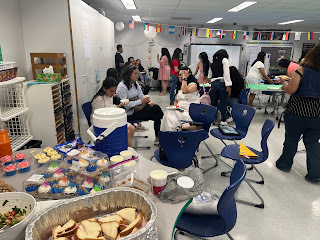
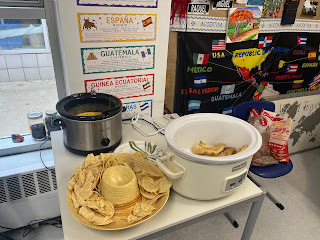
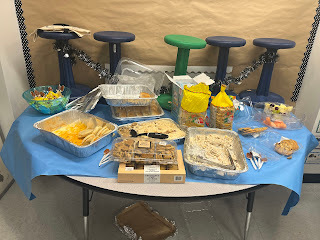
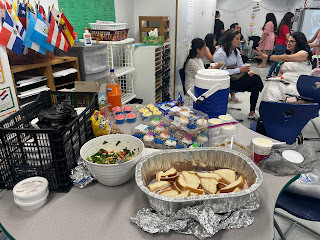
I taught Writing in Spanish to my Legado kids for about 30 minutes a day. I absolutely loved those 30 minutes each day. Sixth graders can write with so much more depth and conviction than second graders, at least once you give them an organizational structure to follow. My two favorite memories from Writing class were when we published our class book about Friendship and when we wrote our New Year's Goals. Five of my students wrote that their goal was to grow closer to Christ and mapped out things they were going to do to help reach that goal. Those papers brought tears to my eyes and really inspired me to cheer them on. I also finished the year with a reflection letter assignment where they told me how they grew as a reader, how I challenged them, how they want me to remember them, and then they also got to challenge me with ways I could improve. Definitely a humbling thing to ask, and I took their feedback to heart. I can work on patience and also having more fun and engaging activities (though I found out they all really did enjoy doing Reader's Theaters. :)) But as much as they fought me on my high expectations throughout the year, they sure did respond at the end by saying how much those high expectations helped them do more than they thought they could do. This Texas teacher would not back down, no matter how much they "hated" me for it. It was one of those, "You'll thank me later" kind of years. So when they did thank me at the end for pushing them to their limit, I knew I did something right. I will treasure that stack of letters for a very long time.
One thing I wished I had done a better job with was NOT calling out behavior. Second graders want to please their teacher, so calling out a child for breaking a rule usually turned them around pretty quickly. They wanted you to be proud of them. I could point out kids who did the right thing, and then others would follow suit to get that same acknowledgement. But twelve year olds don't respond the same to being called out. If you call them out in front of their peers, often the bad behavior or attitude just escalates. And calling out the "good kid" often embarrasses the good kid to the point where they stop doing the right thing so they don't get ridiculed by the other kids. I can say all this in hindsight where I can see much more clearly, but when in the fog of culture shock and just overwhelmed by constantly feeling blindfolded, I didn't always respond the way I would have liked.
Another highlight of my year was finally connecting with a girl who butt heads with me (and couldn't stand me) for the whole first half of the year. Then somehow she began to trust me and see that I really did care about her, and she began to choose success in the last two or three months of school. On the very last day, right when the bell rang to dismiss, she walked up to me with tears in her eyes and hugged me for quite a long time. I got to remind her that I loved her right before she walked off the playground for the last time.
What I am looking forward to in the year ahead.
As much of a challenging, stretching, and humbling experience as I had in sixth grade, I never once regretted the decision. In fact, I found myself inspired by the challenge, always waking up and praying for God to guide my actions, my decisions, and to give me new ideas. He never failed, and I grew so much. I am really thankful for a summer ahead to disconnect from teaching and just relax. Once mid-July comes around, I'll be ready to join my team again and start prepping for another year with a new group of kids. Thankfully I already got to meet them, answer some of their questions, talk in Spanish to them, and read several of their letters to me. We're already ahead of where I started this current year. I'm also thankful for a Legado teammate who wants to pray for our students together--such a great reminder of the mission field in front of us (aka: the American Public School).
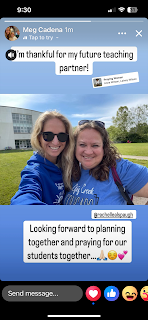 (I copied this from her story because it spoke so deeply to me.)
(I copied this from her story because it spoke so deeply to me.)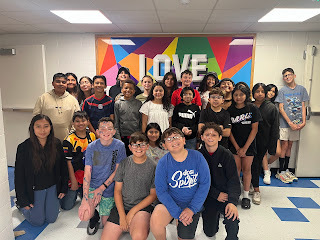 The first 6th grade graduates from the Legado program
The first 6th grade graduates from the Legado program 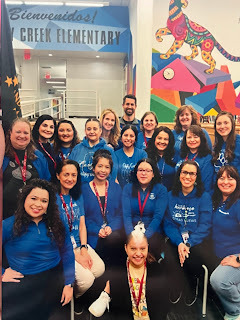 So honored to be part of this small, but growing group of Dual Language teachers here in Columbus, IN.
So honored to be part of this small, but growing group of Dual Language teachers here in Columbus, IN. 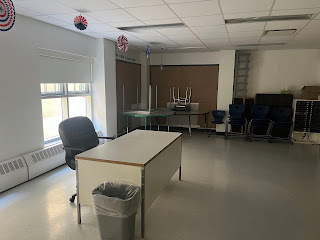
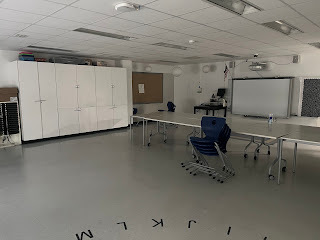
And that's a wrap. Ready for some time to disconnect, recharge, reflect, and relax before this room fills up again with a whole new group of students.



